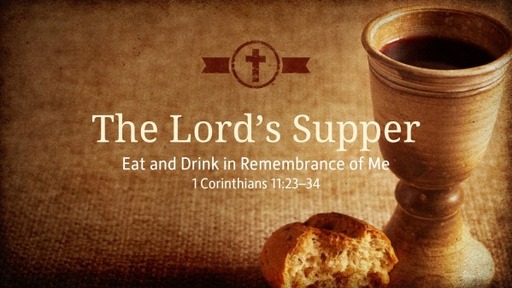The Lord's Supper

Sermon • Submitted • Presented • 1:00:54
0 ratings
· 72 viewsFiles
Notes
Transcript
Worship Remembers that Jesus Saves Us
Worship Remembers that Jesus Saves Us
Status seeing results in shaming other believers.
Remember to look back
Remember to look back
Jesus says remember my body was beaten and torn, disgraced and shamed, and my blood shed in your place.
Jesus Christ died for you so you can live with Him.
Jesus humbled Himself, even to death on a cross. We should humbly submit to Jesus’ rule of our life.
Jesus gave his all so we could have it all. when we surrender to Jesus’ control of our live, we can experience everything Jesus died to give us.
1 Corinthians Explanation of the Text
Jesus thus fulfills Jeremiah’s prophecy that God himself would provide a “new covenant” for his people that would involve the forgiveness of their iniquity and that he would “remember their sins no more” (Jer 31:31–34).
The blood covenant between both parties usually signifies both parties were committed to the treaty. Jesus’ death speaks of his person commitment to the new covenant.
The simplicity of the Lord’s Supper eliminates social, economical, and racial devisions. We all eat the same bread and drink of the cup.
Remember to look forward
Remember to look forward
Proclaim the historical event of our salvation. We are remembering our baptism.
The passover status of the Lord’s Supper conveys the truth of blessings and curses.
The exodus and covenant. Those who trust Jesus are blessed. Those who don’t trust God are cursed.
We are preaching salvation until Jesus returns. We are keeping a short account of our sins.
Remember to look within
Remember to look within
We are not disciplined forever. God doesn’t discipline us out of disgust. He disciplines us because he wants to spare us greater pain.
Remember to look around
Remember to look around
1 Corinthians Explanation of the Text
Certainly, there needed to be a deliberate effort to avoid any elitist behavior, and that would mean a full sharing of food and drink with those who were poor.